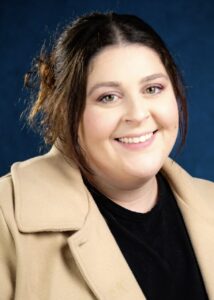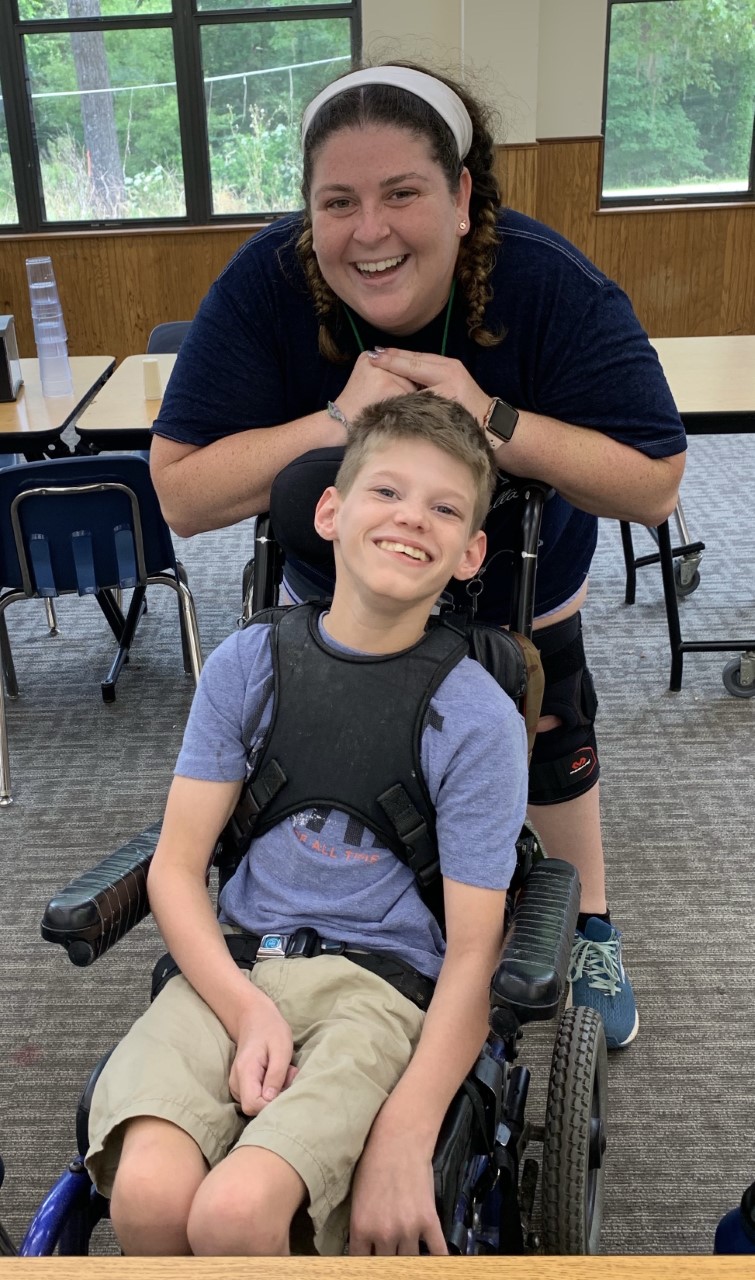 Amanda Brenner is a student in the Katz School's Occupational Therapy Doctorate.
Amanda Brenner is a student in the Katz School's Occupational Therapy Doctorate.By Dave DeFusco
Martin, a young man with autism, is known for being garrulous. He’ll regale you on various topics, such as the military or geography, for as long as you let him. At the AFYA Foundation, he’s popular with the staff and other clients in the day program where Amanda Brenner is doing fieldwork as part of her course of study in the Katz School’s Occupational Therapy Doctorate.
Until Martin met Amanda, his passion for those subjects—one of the traits of autism is a deep interest in a specific topic—got the best of him during job interviews, hindering his ability to get an offer. To improve his chances, Amanda suggested that he settle himself by taking deep breaths, repeat a question to concentrate his mind, pause deliberately to improve his listening skills, and practice introducing himself before starting a conversation with others.
In occupational therapy, “occupations” refer to the activities people need and want to do in their everyday life. They include everything from basic self-care to home and community activities, work, education, play and leisure, sleep and social participation. Martin’s desire to have a job, in the parlance of occupational therapy, is to participate in a meaningful occupation. Occupational therapists help people gain greater independence and confidence in performing these occupations.
 Amanda is director of Camp Dream Street, an overnight program for children with physical disabilities.
Amanda is director of Camp Dream Street, an overnight program for children with physical disabilities.“When I met him, he needed coaching on social skills, but we’ve gotten to the point where he can sit and have a conversation with you,” said Amanda, who meets with several clients twice a week to teach job skills, including how to build a resume. “A lot of it was just making him aware that his gift of gab could be unprofessional in the workplace at times and teaching him the social skills he may never have learned.”
Her advice to Martin paid off almost immediately. He got a job at Trader Joe's, where he performs multiple tasks, including stocking shelves and running the cash register. In a weekly self-assessment, he indicated how proud he was of himself for having the ability to learn and finish tasks, taking orders from supervisors and functioning independently in public.
“An important part of the Katz School’s OT approach is to teach students to adapt the occupation to the client so that we’re helping them make life more manageable for them,” said Amanda.
Dr. Julie Kardachi, director of the Occupational Therapy Doctorate, said students are educated and trained to become scholar-practitioners who develop and deliver inclusive, equitable and evidence-based services through the integration of theory, research and knowledge, augmented by clinical practice.
“Amanda has translated this education into practice in her various fieldwork experiences resulting in this successful outcome for Martin and for her other clients,” she said. “We are tremendously proud of her.”
In addition to the AFYA Foundation, Amanda, through her fieldwork assignments, has helped children between the ages of 5 and 9 with fine motor skills and sensory integration techniques at the Department of Education in the Bronx, and administered a wide range of therapeutic exercise programs that involved improving people’s proficiency with their everyday occupations at Ahava Medical Center in Brooklyn.
Amanda has also helped people with physical disabilities improve their quality of life through fitness and group activities at Independence Care System in Brooklyn. She is also director of the Mississippi-based Camp Dream Street, a five-day, four-night camping program for children with physical disabilities. At the end of June, she will complete a one-year internship with AOTA’s “productive aging” Special Interest Section, which is highly competitive in the profession.
Students in the eight-semester Occupational Therapy Doctorate complete four semesters of coursework, then two semesters in the field and two semesters of research, including a capstone project. A member of the program’s third cohort, Amanda is scheduled to graduate in May 2024.
“I love the Occupational Therapy Doctorate program and I like the faculty. They’re very open to suggestions and questions, and that’s something that I’m big on,” said Amanda. “If I have a question, I want to know the answer. If they don't have an answer, they always help me find it or point me in the right direction.”
The AFYA Foundation, where Martin is a client, is based in Yonkers. They collect unused medical supplies, including sutures, bandages and assorted surgical instruments, from hospitals and medical centers throughout the United States that otherwise would go to a landfill and distribute them to health systems around the world.
“The U.S. is the only country that throws out unused medical supplies,” said Amanda. “We do a spot check for quality and then give these critical supplies a second life by sending them wherever they can help save lives.”
The foundation also teaches vocational skills for clients, like Martin, and others with developmental delays and intellectual disabilities. Every day, they sort through supplies and help prepare eight pallets the size of a conventional refrigerator for shipping.
After graduation, Amanda wants to find a job either in a neonatal intensive care unit or prison system to help inmates develop skills for daily occupations that will prepare them for reentry into society.
“Going into the OT program, I already had a pretty solid background working with kids and those with physical disabilities, so I was like, okay, I’ve got a solid background,” said Amanda. “Within the first two weeks at the Katz School, I was like, I know nothing. I’ve learned so much here, I feel like I can practice occupational therapy anywhere.”
